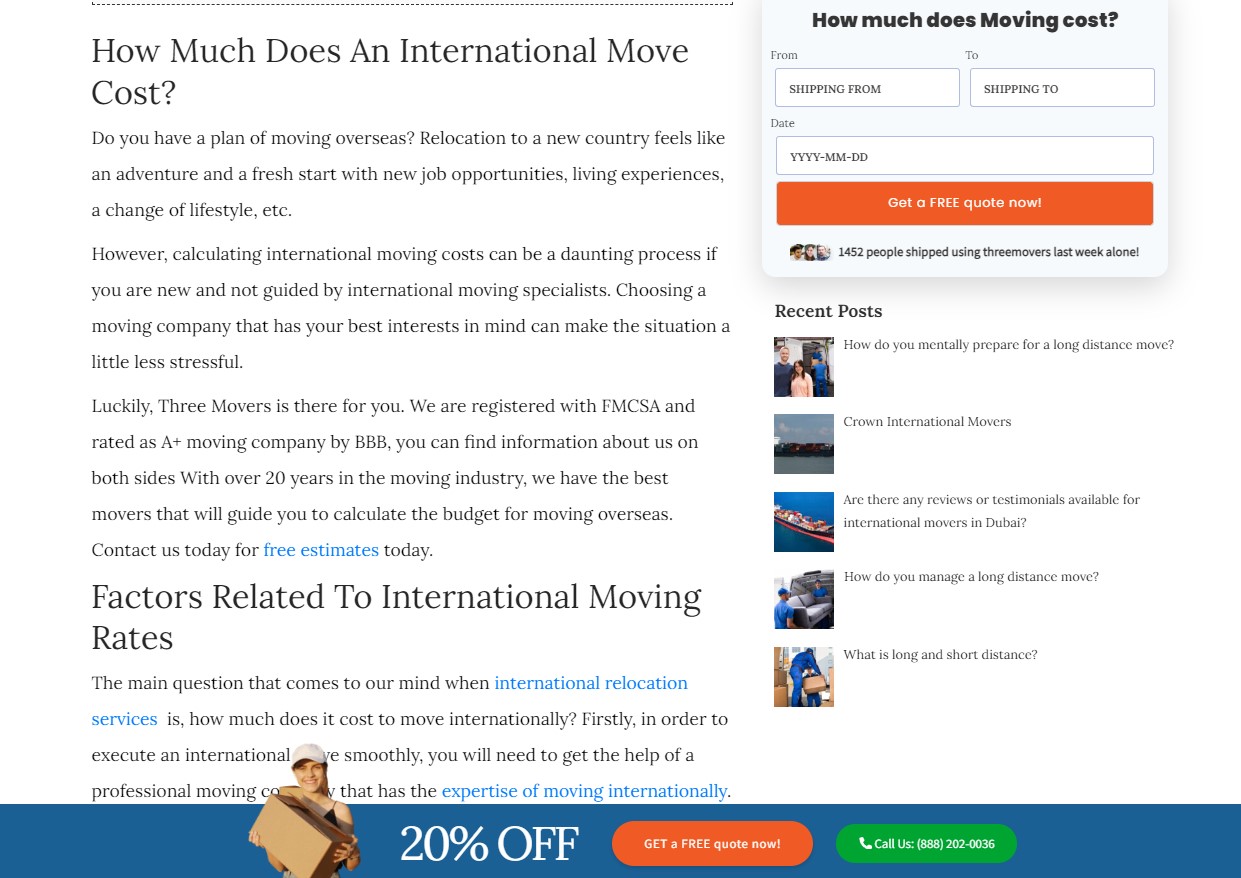Moving to a new country can be an exciting and life-changing experience. However, it also comes with a lot of planning, preparation, and most importantly, cost. As an expert in the field of international moves, I have seen firsthand the financial implications that come with relocating to a different country. In this article, I will provide you with valuable insights on the cost of an international move and what factors contribute to it.
The Three Movers site is incredibly helpful to determine your moving costs, get a free quote here:

The Basics of International Moves
Before we dive into the cost aspect, let's first understand what an international move entails. An international move is when you relocate from one country to another, whether it's for work, education, or personal reasons. This type of move involves crossing borders and requires a lot more planning and logistics compared to a local move.
When it comes to cost, there are two main categories to consider: moving expenses and living expenses. Moving expenses include the actual transportation of your belongings from one country to another, while living expenses refer to the cost of living in your new country.
Moving Expenses
The cost of moving your belongings internationally can vary greatly depending on several factors. The first and most obvious factor is the distance between your current location and your new country. The farther the distance, the higher the cost. Another factor is the volume of your belongings. The more items you have, the more expensive it will be to transport them.
Mode of transportation is another crucial factor that affects the cost of an international move. You can choose to ship your belongings via air, sea, or land. Air freight is the fastest but also the most expensive option. Sea freight is the most common and cost-effective method, but it can take several weeks for your belongings to arrive. Land transportation is usually used for moves within the same continent and can be a more affordable option for shorter distances.
Additional services such as packing, unpacking, and insurance can also add to the cost of an international move. It's essential to discuss these services with your moving company and understand their costs before making a decision.
Living Expenses
The cost of living in a new country can vary significantly depending on the location and your lifestyle. Some countries have a lower cost of living compared to others, so it's crucial to research and understand the costs before making the move.
Housing is usually the most significant expense when it comes to living in a new country. The cost of rent or buying a property can vary greatly depending on the location and type of accommodation. It's essential to research the housing market in your new country and budget accordingly.
Utilities, such as electricity, water, and internet, are also essential expenses to consider. These costs can vary depending on the country's infrastructure and your usage.
Transportation, food, and other daily expenses should also be factored into your budget. These costs can vary depending on your lifestyle and location.
The Hidden Costs of an International Move
Aside from the obvious costs mentioned above, there are also hidden costs that many people tend to overlook when planning an international move. These costs can add up and significantly impact your budget, so it's essential to be aware of them.
Visa and immigration fees are one of the most significant hidden costs of an international move. Depending on your destination country, you may need to pay for a visa, work permit, or other immigration fees. These costs can vary greatly and should be factored into your budget.
Taxes are another hidden cost that many people forget to consider. Depending on your home country and your new country's tax laws, you may need to pay taxes on your income or assets in both countries. It's essential to research and understand the tax implications of your international move.
Currency exchange rates can also affect the cost of an international move. If you're moving to a country with a different currency, you'll need to exchange your money, which can result in additional costs. It's crucial to monitor exchange rates and budget accordingly.
Tips for Reducing International Moving Costs
Moving internationally can be expensive, but there are ways to reduce the costs. Here are some tips from an expert's perspective:
- Purge unnecessary items: The less you have to move, the lower the cost. Take this opportunity to declutter and get rid of items you no longer need.
- Research moving companies: Get quotes from multiple moving companies and compare their costs and services. Don't just go for the cheapest option; make sure to choose a reputable and reliable company.
- Be flexible with your moving date: Moving during peak seasons can be more expensive. Try to be flexible with your moving date to get a better deal.
- Consider shared shipping: If you don't have a lot of belongings, you can save money by sharing a shipping container with someone else who's also moving internationally.
- Research your new country's cost of living: Understanding the costs of living in your new country can help you budget accordingly and avoid any surprises.
In Conclusion
An international move can be a significant financial investment, but it's also an opportunity for growth and new experiences. As an expert in the field, I hope this article has provided you with valuable insights on the cost of an international move and how to budget for it. Remember to research, plan, and be prepared for any unexpected costs. Happy moving!

![Exploring the History of [Neighborhood Name]](https://www.myrtlebeachprofessional.com/img/t3a975d556a2515053f443b8d4393d6c5.jpg?27)




